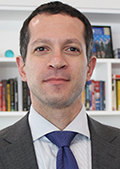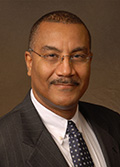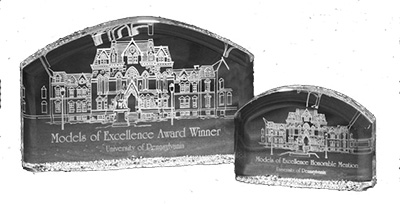Erika James: Dean of the Wharton School at Penn
 Erika H. James has been named the next dean of the Wharton School at the University of Pennsylvania, effective July 1. The announcement was made by Penn President Amy Gutmann and Provost Wendell Pritchett.
Erika H. James has been named the next dean of the Wharton School at the University of Pennsylvania, effective July 1. The announcement was made by Penn President Amy Gutmann and Provost Wendell Pritchett.
“Erika is an award-winning scholar and teacher and a strong, proven leader who serves as dean of the Goizueta Business School at Emory University,” said President Gutmann. “A passionate and visible champion of the power of business and business education to positively transform communities locally, nationally and globally, she is exceptionally well prepared to lead Wharton into the next exciting chapter of its storied history.”
Dr. James’ career has been notable for her commitment to meaningful cross-disciplinary collaboration, superb scholarship, passionate teaching and excellence through diversity and inclusion. Since becoming dean of the Goizueta Business School in 2014, she has introduced and led an effort to build an innovation and entrepreneurship lab open to all students on campus. She grew the Goizueta faculty by 25 percent by the end of her first term, building a critical mass of junior faculty and seasoned scholars in key academic areas such as behavioral and decision-based research, business analytics and health-care innovation. With strong faculty input and support, she also expanded corporate engagement with the creation of a research-based corporate think tank.
“Erika has consistently and constructively drawn upon her own scholarship in the areas of leadership development, organizational behavior, gender and racial diversity, and crisis leadership,” Provost Pritchett said, “applying her own insights into human behavior to foster a work culture that allows people to thrive personally and professionally. She has led faculty and student workshops on such topics as unconscious bias and building trust across divides and has been engaged as a consultant by some of the nation’s largest and most prestigious firms.”
“This is an exciting time to be in business education,” Dr. James said. “The scope and platform of the Wharton School provides an opportunity to create far-reaching impact for students, scholars and the business community.”
At Emory, Dr. James undertook a significant redesign of the undergraduate business curriculum, integrating immersive learning, technology and partnerships with Emory College’s liberal arts curriculum.
Prior to her deanship, she served as the senior associate dean for executive education at the University of Virginia Darden School of Business, working closely with faculty to re-imagine executive education and lifelong learning opportunities.
Dr. James is an active member of the SurveyMonkey Board and the Graduate Management Admission Council, and she previously served on the board of the Association to Advance Collegiate Schools of Business, the foremost accrediting body in business education. She was awarded the Earl Hill Jr. Faculty Achievement and Diversity Leadership Award from The Consortium, an organization committed to increasing diversity in business, starting with graduate school admissions. She has also been named one of the Top 10 Women of Power in Education by Black Enterprise and as one of the Power 100 by Ebony magazine.
Dr. James holds a PhD and master’s degree in organizational psychology from the University of Michigan and a bachelor’s degree in psychology from Pomona College in California. In addition to her roles at Emory and UVA, she has served as an assistant professor at Tulane University’s Freeman School of Business and a visiting professor at Harvard Business School.
Dr. James will succeed Geoff Garrett as dean of Wharton. Dr. Garrett is to become dean of the University of Southern California’s Marshall School of Business (Almanac July 16, 2019).
“Wharton has risen to even greater heights throughout Geoff’s enormously successful six-year tenure, reinforcing all of its traditional strengths while also building its global force in data analytics, entrepreneurship, fintech, behavioral economics and other fields that are defining the future of business,” President Gutmann said.
Stacey Lopez: Vice President for Institutional Research and Analysis
 Penn President Amy Gutmann announced that Stacey Lopez has been promoted to vice president for institutional research and analysis at the University of Pennsylvania.
Penn President Amy Gutmann announced that Stacey Lopez has been promoted to vice president for institutional research and analysis at the University of Pennsylvania.
Dr. Lopez has led the Office of Institutional Research and Analysis since 2007 (Almanac October 16, 2007), initially as assistant vice president until 2015 and then as associate vice president.
In announcing the promotion, President Gutmann said, “Stacey’s work as a leader—both at Penn and nationwide in higher education—has been truly exemplary. She and her team provide strategic decision support and insightful data collection and analysis that is vital to our successful management of the University of Pennsylvania. It is therefore most fitting that we elevate Stacey to vice president. She is universally recognized and respected as a national leader in this field, and we are extraordinarily fortunate to have her at Penn.”
Dr. Lopez holds a bachelor’s degree (magna cum laude) and two master’s degrees, one in mathematics and statistics and another in industrial and manufacturing engineering, all from Wichita State University in Kansas. She also holds a doctorate in higher education management from Penn.
Michael Horowitz: Director of Perry World House & Richard Perry Professor
 President Amy Gutmann and Provost Wendell Pritchett recently announced the appointment of Michael Horowitz as director of Perry World House and Richard Perry Professor. Dr. Horowitz is currently interim director of Perry World House and professor of political science in the School of Arts and Sciences.
President Amy Gutmann and Provost Wendell Pritchett recently announced the appointment of Michael Horowitz as director of Perry World House and Richard Perry Professor. Dr. Horowitz is currently interim director of Perry World House and professor of political science in the School of Arts and Sciences.
“Penn’s Perry World House is a leading convener of preeminent thinkers and doers, all committed to great global policy,” said President Gutmann. “To lead Perry World House, we searched for an accomplished scholar in the study of global and international issues. We also sought someone with a distinct vision for global policy and a robust network of global academics and policy makers to help see that vision through to implementation. In Mike, we get both: an outstanding scholar and a seasoned visionary with a network of relationships among global policy makers.”
Dr. Horowitz is a world-renowned scholar of global politics and international relations. He has taught at Penn since 2007 and served as associate director of Perry World House from 2015 until his appointment as interim director in 2019. He is the recipient of the 2017 Karl Deutsch Award from the International Studies Association, presented annually to a scholar under age 40 who has made the most significant contribution to the study of international relations and peace research. He authored The Diffusion of Military Power: Causes and Consequences for International Politics (Princeton University Press, 2010), a landmark study that received awards from, among others, the Mershon Center for International Security Studies, the International Security Studies Section of the International Studies Association and the Society of Policy Scientists.
“Mike Horowitz is the ideal leader to chart the future of Perry World House,” said Provost Pritchett. “He has been central to its mission from the beginning, galvanizing dialogue and research to address the most critical global challenges. Now he will help us build on the outstanding work begun by professor William Burke-White, the founding director of PWH, in sustaining the essential place of global issues at the heart of our campus. I am confident that we will greatly benefit from his energetic and visionary leadership in the years ahead.”
Dr. Horowitz has been published in a wide array of peer-reviewed journals as well as in popular media like The New York Times and Politico Magazine, and he co-authored Why Leaders Fight (Cambridge University Press, 2015). He is a member of the Council on Foreign Relations, a consultant to the National Security Commission on Artificial Intelligence and affiliated with the Foreign Policy Research Institute, the Center for Strategic and International Studies, and the Center for a New American Security. He earned a PhD in government from Harvard University and a BA summa cum laude in political science from Emory University.
“Mike has made tremendous contributions to the work Perry World House has undertaken over the last three years,” said Vice Provost for Global Initiatives Ezekiel Emanuel, “and made Perry World House a catalyst for Penn’s global engagement. As director, Mike will be able to cement Perry World House’s reputation as an international thought-center on issues of global governance, global migration and other key challenges facing our world. With his demonstrated dedication to mentoring undergraduate and graduate students, the Penn community can look forward to an exciting era in the study of and engagement with global issues.”
Perry World House was founded in 2015 as a center for scholarly inquiry, teaching, research, international exchange, policy engagement and public outreach on pressing global issues. Its mission is to bring the academic knowledge of the University of Pennsylvania to bear on some of the world’s most pressing global policy challenges and to foster international policy engagement within and beyond the Penn community. Located in the heart of campus at 38th Street and Locust Walk, it draws on the expertise of Penn’s 12 schools and numerous globally oriented research centers to educate the Penn community and prepare students to be well-informed global citizens. At the same time, Perry World House connects Penn with leading policy experts from around the world to develop and advance innovative policy ideas.
“I am enormously honored to lead Perry World House,” said Dr. Horowitz. “Penn has a special commitment to blending theory and practice to address society’s most challenging questions and dilemmas. Perry World House is central to that mission. I look forward to ensuring the continued growth of Perry World House and convening diverse groups of faculty, students and policymakers as we bring the world to Penn and Penn to the world.”
2020-2021 Tuition, Financial Aid Budget: Expanding Support for Middle-Income Families
At its meeting last Friday, the University of Pennsylvania Board of Trustees approved a 3.9% increase in tuition for the coming year, while also approving a record $256 million undergraduate financial aid budget, the largest financial aid budget in Penn’s history.
Since Amy Gutmann became Penn’s president in 2004, increasing the financial aid budget has been a top priority, with the University awarding more than $2 billion in undergraduate aid to more than 22,000 students.
Penn administrators also announced that, as part of a new initiative to expand aid for middle-income families in 2020-2021, students with household incomes of up to $140,000 a year (with typical assets) will receive financial aid packages covering the cost of tuition.
“The University is constantly seeking out new opportunities to increase access and affordability for families at all income levels,” said MaryFrances McCourt, vice president for finance and treasurer. “Our steadfast commitment is to meet 100% of a student’s demonstrated need with grants and work-study funding, and average financial aid packages for low- and middle-income families go well beyond tuition.”
To maintain Penn’s world-class academic programs, campus and student services, undergraduate student charges for 2020-2021 are: $53,166 for tuition, $6,876 for fees, $11,014 for housing and $5,770 for dining.
“A measured increase in tuition makes it possible to invest in the resources and programs that make a Penn education the best in the world, while simultaneously maintaining a robust and growing undergraduate aid budget,” said Trevor Lewis, vice president for budget planning and analysis.
Penn’s financial aid program supports its philosophy that a world-class education should be attainable for talented students from all financial backgrounds. Currently, 45% of Penn’s undergraduate students receive grant-based financial aid packages, with an average of $56,693 in funding—more than the cost of tuition. Students whose families have incomes less than $65,500 (with typical assets) receive financial aid packages that cover tuition, fees, room and board. New programming launched last year for these highly-aided students includes first-year laptop grants and access to summer internship and research opportunity funding.
The University’s student resources extend beyond financial aid. This January, Penn launched Financial Wellness @ Penn (Almanac February 4, 2020), an initiative that aims to enhance students’ financial well-being by providing personal finance education, tools and resources.
“All students, regardless of their level of financial need, can benefit from core financial literacy education,” said Ms. McCourt. “We are empowering students with the information they need to make important financial decisions and plan for their financial futures.”
Since establishing a grant-based financial aid program in 2008, Penn has increased its financial aid budget by more than 150%. Over the past five years, the budget for financial aid has expanded at an average rate of 4.1%, greater than the rate of tuition. Today, Penn is the largest US university with need-blind admission and grant-based financial aid for undergraduates.
Penn’s grant-based financial aid program is aligned with the inclusion goals outlined in the Penn Compact 2020 Presidential Initiatives, which include a comprehensive effort to raise additional funding for the endowment to support undergraduate financial aid as well as graduate and professional student aid.
Additional information on undergraduate financial aid at Penn is available at www.srfs.upenn.edu
March 2 Update
To the Penn Community:
We are writing with an update on important new developments in Penn’s response to the global outbreak of coronavirus disease (COVID-19). This is a fast-evolving situation that is understandably causing high levels of concern.
A University-wide task force has been charged with reviewing – and updating as needed – our existing pandemic planning procedures. It is led by Dr. Benoit Dubé, Chief Wellness Officer, and Michael Fink, Deputy Chief for Tactical and Emergency Readiness of the Penn Police, working with experts across campus and coordinating with the Centers for Disease Control and Prevention (CDC) and other government agencies.
Effective immediately, all University-affiliated travel to China, Italy, Iran, and South Korea is suspended in accordance with CDC guidance. We strongly recommend that all members of the Penn community also avoid any personal travel to these countries. If you do travel to any of these countries, we recommend 14 days of self-isolation before returning to campus. Please also register all Penn-related travel so that we will know where you are and can provide resources in case of an emergency.
As spring break approaches, we ask all travelers to weigh the necessity of any upcoming travel and understand the risks involved, even beyond the CDC risk assessment. All international travelers are putting themselves at an increased risk of exposure to coronavirus disease. This potential exposure can be compounded by unexpected delays and cumbersome logistics upon returning to the US, including the potential for missed classes due to self-isolation. We urge all members of the Penn community to consider these risks when deciding whether to move forward with their travel plans.
We have been in close contact with Penn students currently on study abroad programs and are advising them on options to return home. Schools and centers that are planning short-term study abroad or non-credit programs for Spring Break should review these programs and consider postponing or providing alternative activities for students who are not comfortable traveling abroad at this time.
We appreciate the help of every member of the Penn community, and we will continue to update our central University webpage with answers to Frequently Asked Questions, as well as other essential resources and information.
February 26 Update
To the Penn Community:
We are writing with an update on Penn’s response to the novel coronavirus (COVID-19). There is an understandably high level of concern as this virus spreads, and we are closely monitoring the evolving situation. Dr. Benoit Dubé, our Chief Wellness Officer, is leading these efforts, partnering with Penn Medicine, Penn Global and public health leaders across the campus, city and state.
We have created—and will continually update—one Penn webpage with answers to Frequently Asked Questions, as well as other resources and information about the coronavirus.
Penn travelers with questions about travel abroad should consult the Centers for Disease Control and Prevention (CDC) for guidance on travel restrictions. The CDC has recently issued travel warnings and alerts for China, South Korea, Iran, Italy and Japan, which include avoiding all non-essential travel to mainland China and South Korea. All other travel can continue at the discretion of the sponsoring School, center or program. Please register all Penn-related travel so that we will know where you are and can provide resources in case of an emergency.
Penn travel recommendations will continue to align with CDC travel guidelines. For example, if the CDC raises a warning level on a country to level 3 (avoid all non-essential travel), Penn will similarly restrict University-affiliated travel to that country or region. If you are a faculty or staff member who has essential University travel to a level 3 country (currently China or South Korea), you must notify your dean of your travel plans, clearly outlining the essential reasons for travel. Your dean will then work with Risk Management and the Wellness Office to consider your travel request.
Any travelers returning from China will be asked to self-isolate for 14 days in accordance with guidelines from the Philadelphia Department of Public Health. As this is a rapidly evolving situation, Penn will adopt additional guidelines for self-isolation for travelers from other countries as recommended. Please keep this in mind as you plan spring break travel.
Influenza-like illnesses are still common at this time of year, and we advise everyone to take steps to stay healthy, including getting a flu vaccine, frequent handwashing, avoiding shared utensils, covering coughs and sneezes with a tissue or your sleeve, and staying home if you are not feeling well.
We appreciate the help of every member of the Penn community, and we will continue to update you as this global situation moves forward.
—Wendell E. Pritchett, Provost
—Craig R. Carnaroli, Executive Vice President
—Ezekiel J. Emanuel, Vice Provost for Global Initiatives
—Benoit Dubé, Associate Provost and Chief Wellness Officer
2020 Performance and Staff Development Program
Open and effective communication is essential when it comes to enhancing performance and achieving goals. The Performance and Staff Development Program (the annual performance appraisal program) provides staff and supervisors with a formal process to enhance communication and promote a productive work environment.
The performance appraisal process provides benefits for both the staff member and the supervisor, such as:
- Providing documented feedback on job expectations, performance and accomplishments from the past year
- Offering positive reinforcement as well as developmental feedback
- Allowing staff members to participate in goal setting
- Setting performance expectations and goals for the upcoming year
- Encouraging open communication between staff and supervisors
- Promoting discussion of professional development opportunities and the competencies required to be successful in their job
- Ensuring that job performance and accomplishment information is recorded in each staff member’s official personnel file
Beginning March 16, 2020, staff and supervisors should use the Online Performance Appraisal System to complete self-appraisals and annual performance appraisals. Performance appraisals for all eligible regular staff should be completed and entered into the Online Performance Appraisal System by June 1. The Online Performance Appraisal System can be accessed at https://portal.hr.upenn.edu/
Valuable information on the performance appraisal process can be found on the Human Resources website at https://www.hr.upenn.edu/performance-management Here you’ll find a variety of materials to guide you in completing quality appraisals and providing effective performance and professional development feedback.
For more information on the Performance and Staff Development Program, contact your School’s or Center’s Human Resources professional or the Division of Human Resources at (215) 898-6093.
—Division of Human Resources
 Erika H. James has been named the next dean of the Wharton School at the University of Pennsylvania, effective July 1. The announcement was made by Penn President Amy Gutmann and Provost Wendell Pritchett.
Erika H. James has been named the next dean of the Wharton School at the University of Pennsylvania, effective July 1. The announcement was made by Penn President Amy Gutmann and Provost Wendell Pritchett.
 Penn President Amy Gutmann announced that Stacey Lopez has been promoted to vice president for institutional research and analysis at the University of Pennsylvania.
Penn President Amy Gutmann announced that Stacey Lopez has been promoted to vice president for institutional research and analysis at the University of Pennsylvania.  President Amy Gutmann and Provost Wendell Pritchett recently announced the appointment of Michael Horowitz as director of Perry World House and Richard Perry Professor. Dr. Horowitz is currently interim director of Perry World House and professor of political science in the School of Arts and Sciences.
President Amy Gutmann and Provost Wendell Pritchett recently announced the appointment of Michael Horowitz as director of Perry World House and Richard Perry Professor. Dr. Horowitz is currently interim director of Perry World House and professor of political science in the School of Arts and Sciences.-resized.jpg) Robert Harris Dyson, Jr., world-renowned Near Eastern archaeologist, scholar, educator, Williams Director Emeritus of the University of Pennsylvania Museum of Archaeology and Anthropology and emeritus professor of anthropology, died peacefully after a long illness on February 14 in Williamsburg, Virginia. He was 92.
Robert Harris Dyson, Jr., world-renowned Near Eastern archaeologist, scholar, educator, Williams Director Emeritus of the University of Pennsylvania Museum of Archaeology and Anthropology and emeritus professor of anthropology, died peacefully after a long illness on February 14 in Williamsburg, Virginia. He was 92.  Angela Duckworth, Christopher H. Browne Distinguished Professor of Psychology and co-founder and CEO of the Character Lab, was included in the top 10 of Education Week’s 2020 Edu-Scholar Public Influence Rankings. The list, created by Rick Hess, the director of education policy studies at the American Enterprise Institute, recognizes scholars whose work shapes public discussion around education.
Angela Duckworth, Christopher H. Browne Distinguished Professor of Psychology and co-founder and CEO of the Character Lab, was included in the top 10 of Education Week’s 2020 Edu-Scholar Public Influence Rankings. The list, created by Rick Hess, the director of education policy studies at the American Enterprise Institute, recognizes scholars whose work shapes public discussion around education. Joseph S. Francisco, President’s Distinguished Professor and professor of chemistry in Penn’s School of Arts and Sciences, was recently elected to the Council of the National Academy of Sciences.
Joseph S. Francisco, President’s Distinguished Professor and professor of chemistry in Penn’s School of Arts and Sciences, was recently elected to the Council of the National Academy of Sciences. César de la Fuente, Presidential Assistant Professor in the departments of psychiatry, microbiology and bioengineering at the Perelman School of Medicine, was awarded the first Langer Prize for Innovation and Entrepreneurial Excellence by the American Institute of Chemical Engineers (AIChE). The fellowship is named for biomedical pioneer Robert Langer of the Massachusetts Institute of Technology. The Prize, which aims to support rising stars in the early stages of their careers, provides an unrestricted grant to enable creative researchers and engineering entrepreneurs to tackle high-risk, high-impact challenges with the potential of achieving game-changing innovations. Dr. de la Fuente received the award this past fall at the 2019 AIChE Annual Meeting in Orlando, Florida.
César de la Fuente, Presidential Assistant Professor in the departments of psychiatry, microbiology and bioengineering at the Perelman School of Medicine, was awarded the first Langer Prize for Innovation and Entrepreneurial Excellence by the American Institute of Chemical Engineers (AIChE). The fellowship is named for biomedical pioneer Robert Langer of the Massachusetts Institute of Technology. The Prize, which aims to support rising stars in the early stages of their careers, provides an unrestricted grant to enable creative researchers and engineering entrepreneurs to tackle high-risk, high-impact challenges with the potential of achieving game-changing innovations. Dr. de la Fuente received the award this past fall at the 2019 AIChE Annual Meeting in Orlando, Florida.


